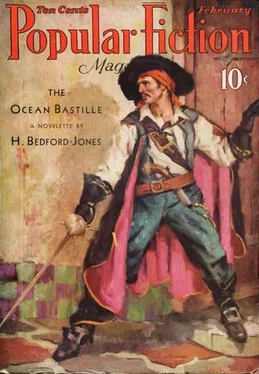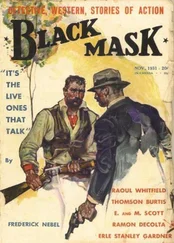Horace McCoy - Bombs for the General (Short Story)
Здесь есть возможность читать онлайн «Horace McCoy - Bombs for the General (Short Story)» весь текст электронной книги совершенно бесплатно (целиком полную версию без сокращений). В некоторых случаях можно слушать аудио, скачать через торрент в формате fb2 и присутствует краткое содержание. Год выпуска: 1932, Издательство: Metropolitan Publishers, Жанр: Детектив, на английском языке. Описание произведения, (предисловие) а так же отзывы посетителей доступны на портале библиотеки ЛибКат.
- Название:Bombs for the General (Short Story)
- Автор:
- Издательство:Metropolitan Publishers
- Жанр:
- Год:1932
- ISBN:нет данных
- Рейтинг книги:5 / 5. Голосов: 1
-
Избранное:Добавить в избранное
- Отзывы:
-
Ваша оценка:
- 100
- 1
- 2
- 3
- 4
- 5
Bombs for the General (Short Story): краткое содержание, описание и аннотация
Предлагаем к чтению аннотацию, описание, краткое содержание или предисловие (зависит от того, что написал сам автор книги «Bombs for the General (Short Story)»). Если вы не нашли необходимую информацию о книге — напишите в комментариях, мы постараемся отыскать её.
Bombs for the General (Short Story) — читать онлайн бесплатно полную книгу (весь текст) целиком
Ниже представлен текст книги, разбитый по страницам. Система сохранения места последней прочитанной страницы, позволяет с удобством читать онлайн бесплатно книгу «Bombs for the General (Short Story)», без необходимости каждый раз заново искать на чём Вы остановились. Поставьте закладку, и сможете в любой момент перейти на страницу, на которой закончили чтение.
Интервал:
Закладка:
Horace McCoy
Bombs for the General

Chapter I
There was no high tribunal on the Toul front in the early summer of ‘18 to pass judgment on whether or not you had the stuff to stick in combat work. You had one chance, just one, to make good and bang! as fast as that it was over. If you stood the test you had long hours, a wracking grind and perhaps a hero’s death to look forward to; if you failed you went back. It mattered not how swell a guy you were nor whom you knew at G.H.Q.—back you went.
Quite a few were going back in those days. They lacked some sort of spark or callousness, something was missing. Few had the inclination, nobody the time, to help them discover what it was.
Up in Flanders the harassed Haig had just issued his desperate “backs to the wall” order; from Arras to Luneville the Boche were raising hell and out on the Somme somebody had pot-shotted Richtofen and his triplane into immortality. Thus inspired, the Allies banged into the air with every crate they could muster—the Baron was gone—recklessly determined to drive Jerry out of the sky... and at the Toul airdrome General Gerard and Billy Mitchell were hanging the green and red ribbon of the Croix de Guerre on Peterson, Meissner and a promising young lieutenant named Rickenbacker...
Those cherished bits of bronze were the rewards of experience. Without that you couldn’t hope to do much; and yet the attitude of the fighting pilots was strange, for they expected the green men coming up to have it. When you reported for duty you were expected to have had at least fifty hours on combat, or that was what you felt. Where did they expect you to get it? At birth? Out of a bottle of vin rouge? Where else? Certainly you couldn’t get it at ground school. They gave you, Heaven knows, everything else—the works, then they transferred the responsibility of your soul to God and shoved you off to the front.
And you came along, eyes sparkling, chin high, your boots drumming defiantly on the Rue Royale as you stopped over in Paris for what you were certain was the final look-see; your brain hummed a fierce litany to the memories of Guenemer and Chapman and Nimmie Prince and other stout souls who had gone west; and you clicked your jaws together and jumped off on the final lap swearing to show those dirty Huns a thing or two about air fighting.
Youth! High spirited, striding along the skies seeking a place to die! Never realizing, never caring much either, that experience was so vital.
Such a chap was Big George Dorman. He was tall and gangling and rawboned; he came from Texas where all horses buck and all men shoot. Now for fourteen months he had dreamed of nothing but air warfare. And he came equipped too, as well as any man could. When he rode the ‘cognac special’ out of Issoudon for combat duty he had a thorough knowledge of gunnery, meteorology; he knew the vagaries of Spads, Camels and Nieuports—knew them backwards and forwards and down through the middle. He backed this knowledge with as sturdy a heart as ever any crusader of any age knew.
For a warrior so well accoutered it naturally would be presumed success was inevitable. But it wasn’t.
Dorman had failed.
Odd how a chap who lives so intensely for his first taste of actual war, who has run over it in theory a hundred times and more, odd how a chap that keen for service jams himself at the first opportunity.
Odd, too, that he should have at once been transferred back to Orly and made a ferryman, for there were scores up there; weary, tired men and men who simply had a bellyful of war—scores of them who would have welcomed such a change. But ferrying... gad, sirs, there was a job for you! Running tested ships up to the advanced airport and taking the crippled back to base. A job for an old man it was.
And yet here he was, Dorman, the big Texan who had come the four thousand miles from the Rio Grande to the Moselle to scrap the Huns—here he was riding the cockpit of a camber-splintered Nieuport 23 back to Orly while a hundred kilometers north...
Passing over Chaumont at five hundred meters he looked down on the great rectangular chateau that was Pershing’s headquarters; and he visualized himself putting the bus down nearby and marching smack into the General’s office and demanding action. He could almost see the surprise on Pershing’s face.
“General, sir,” he’d say; “I’m Lieutenant Dorman, late of Pursuit Group, one of the Ninety-Fourth. The first time in battle I funked and was sent back. Now I’d like to return.”
General Pershing would (or would he?) put on his professional visage and say: “How’d it happen, Lieutenant?”
Well, no matter what the General would say, or wouldn’t say, he’d get the story right there and then, truthfully, unembellished and with nothing overlooked. He might be offended, he might be amused and then there was a chance that he’d have some attaché throw the lieutenant out on an ear, but the story he would hear.
Two days (Dorman would begin) he’d been up when it happened. May nineteen was the date; dull, gray and misty. Atrocious flying weather but just the sort of weather you’d find around Toul in the early summer of ‘18. It looked like a day of no patrols, no work except for the alerts; a day when you could get together in the cubicles over several bottles and rub elbows with Campbell and Winslow and Lufbrey and listen to the masters. Oh, a green youngster could have done worse than draw this outfit!
But along about noon the mist blew itself on up towards St. Mihiel and the clouds lifted. The sky cleared and good visibility was restored. Dorman remembered Luf winking a shrewd eye at Campbell and saying:
“Well, Doug, it looks like work outside now.”
And Campbell, delightfully intimate with the biggest name in A.E.F. flying, laughed and said: “Sure, somebody has to work to make up for all you gold-bricks.”
Only Campbell was kidding. Of course, Luf wasn’t really gold-bricking. He was down with a pretty high temperature, he was stretched out on his bunk. The bunk, if nothing else, proved his greatness for it wasn’t a plank-bottomed, uncomfortable bunk over which you dropped a mattress and were content. No. Luf’s bunk was made out of the rubber shock-absorbed wrappings off defective undercarriages—and gentlemen that was luxury then.
Luf had his boots off, his blouse was unbuttoned and his Sam Browne belt was unhooked. He didn’t look like the fellow whose name was in all the headlines back home. His hands were clasped behind his neck, his little mustache wiggled fraternally as he smiled... Luf was forever smiling in a sort of futility, as if he sensed the finish.
Across his blouse were six ribbons in a double row, and one of them was unclasped and sticking out at right angle. Dorman remembered that; he was sitting on an empty five-gallon wine keg marveling at the indifference of the men who come to grips with death and for whom each moment may be the last. That ribbon, for example. Solid blue bar, it was; with thin red and white pipings at the ends. The D.S.C. And there it was about to fall to the ground. A lot Luf seemed to care.
Laughter and talk and jokes...
Silly sort of war, Dorman reflected. Damned silly. Like a play. Here gathered the great and the near-great to laugh and talk in raucous tones of women and leaves and leaves and women... and sometimes, (not often) of the narrow squeaks they’d had. Luf told them of what a hell of a show it was that day up at Rancourt, on the Peronne-Bapaume highway, when C-3, which was Guynemer’s outfit, got in a mess and had to be helped out by Bert Hall, Pavelka, him and a couple of others out of the Lafayette.
Читать дальшеИнтервал:
Закладка:
Похожие книги на «Bombs for the General (Short Story)»
Представляем Вашему вниманию похожие книги на «Bombs for the General (Short Story)» списком для выбора. Мы отобрали схожую по названию и смыслу литературу в надежде предоставить читателям больше вариантов отыскать новые, интересные, ещё непрочитанные произведения.
Обсуждение, отзывы о книге «Bombs for the General (Short Story)» и просто собственные мнения читателей. Оставьте ваши комментарии, напишите, что Вы думаете о произведении, его смысле или главных героях. Укажите что конкретно понравилось, а что нет, и почему Вы так считаете.












